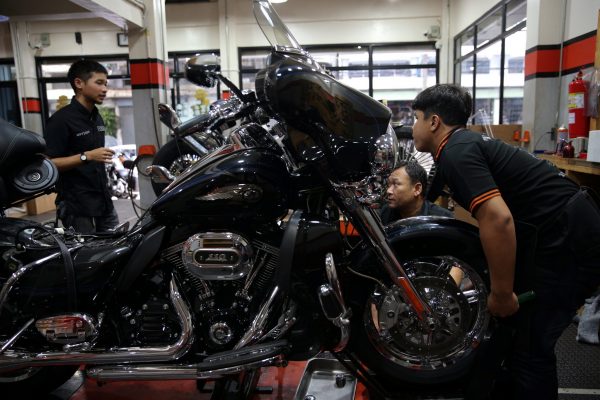The hardest hit countries are Argentina and Turkey, which are experiencing fiscal issues complicated by their political situations. Brazil, South Africa and the emerging countries in Asia have also been affected — albeit at a lower rate of depreciation of their currencies in the 10 to 12 per cent range. Even Australia and China have experienced depreciations of around 8 per cent and 5 per cent respectively.
The level of depreciation experienced by different economies reflects how investors perceive their different fundamental macroeconomic conditions, especially the level of their current account and fiscal deficits and policy outlooks.
The rising US dollar raises questions about the capacity of emerging economies to service their dollar-denominated debts and the vulnerabilities this could expose in their financial systems. Even if the current economic conditions point to a low potential for contagion from Argentina and Turkey, IMF Managing Director Christine Lagarde recently warned that ‘these things could change rapidly’. The uncertainty that already exists is a clear and present danger.
The uncertainty in the world economy has been increasing since Brexit and the election of President Trump in 2016, and in 2017 as the United States left the Trans-Pacific Partnership and announced many threats to impose trade restrictions. This uncertainty has heightened since January 2018 when US President Donald Trump made good on his threats to remedy bilateral trade deficits — what he sees as ‘unfair trade’ practices against the United States — by imposing tariffs on imported solar panels and washing machines, followed by aluminium and steel.
Since March, the greatest uncertainty has been from the brewing tit for tat trade conflict between the United States and China, which started with the imposition of 25 per cent tariffs on US$50 billion worth of China’s exports to the United States. China retaliated with the same sized tariffs on the same amount of trade from the United States. Trump then escalated the trade war further in September with the announcement of 10 per cent tariffs on US$200 billion worth of China’s exports to the United States.
The US–China trade conflict and the uncertainty surrounding it is expected to have knock on effects on global trade and investment flows. The impact of the reduction in China’s exports to the United States on China’s growth will reduce China’s imports, which in turn will impact the many countries that China has become a major trading partner for.
This means that China and other countries facing US trade restrictions will look for new markets for their goods. The situation has already led some countries to impose restrictions or initiate trade remedy investigations, for instance on steel. This uncertainty has and will continue to influence trade and investment, as businesses evaluate how the increased restrictions will affect their supply chains.
It is too early to tell how large the disruption will be, as it is not easy to dismantle supply chains. But the costs down the line could be great as businesses re-evaluate their trade and investment decisions to insulate themselves from tariffs rather than to maximise their competitiveness.
The most concerning aspect of all this is that, after 75 years of being its greatest advocate, the United States is now the biggest threat to the future of the rules-based trading system that has provided predictability and fairness in the way the world engages in trade. There is no clear light at the end of the tunnel.
The key question is: what is Trump’s intention? Is it to change the rules of the game to benefit the United States and address China’s ‘non-market-oriented policies’ or is it just anti-trade and America First? Assuming it is the former, there are at least three important responses needed.
First is safeguarding the stability of the World Trade Organization (WTO) as the overarching framework to provide predictability, fairness and stability. To this end, it is vital that the WTO dispute settlement mechanism continues to operate. The test case is the Chinese and EU case against US steel and aluminium tariffs and getting past the blocking of panel judge nominations by the United States.
Ensuring that the United States does not use blunt unilateral instruments to address its concerns also means that reforms to the WTO rule book are needed. More must be done to address concerns around intellectual property rights, investment, the environment, labour, competition policy, subsidies, tax, digital data and the treatment of developing countries.
Second, the process of opening-up must continue, with or without the United States. The Comprehensive and Progressive Agreement for Trans-Pacific Partnership is a good start. And it is of the utmost importance that the Regional Comprehensive Economic Partnership negotiations are concluded in November this year. These are all important processes to signal the continued commitment of East Asia to expanding markets and fostering flows of trade and investment.
Third, and what most will agree is the most important process, is unilateral reforms. Given increased global uncertainty and limited policy space for fiscal stimulus, structural reforms are a must for East Asian countries, especially China. These range from trade and investment reforms, as well as reforms related to competition policy, intellectual property, the role of state-owned enterprises and sustainability. As in the past, unilateral reforms are more successfully undertaken when there is peer pressure and benchmarking from international commitments.
Without concerted effort and a coalition of willing leadership, including from the EU and East Asia, the future of the rules-based trading system will remain under threat.
Mari Pangestu is former Indonesian trade minister and Professor at the University of Indonesia.
This article appeared in the most recent edition of East Asia Forum Quarterly, ‘Asian crisis, ready or not’.

